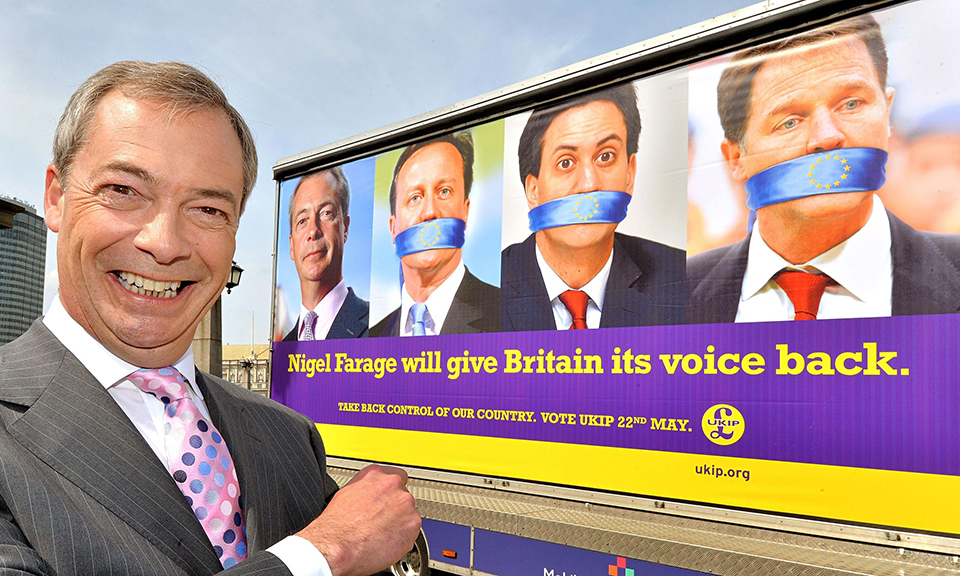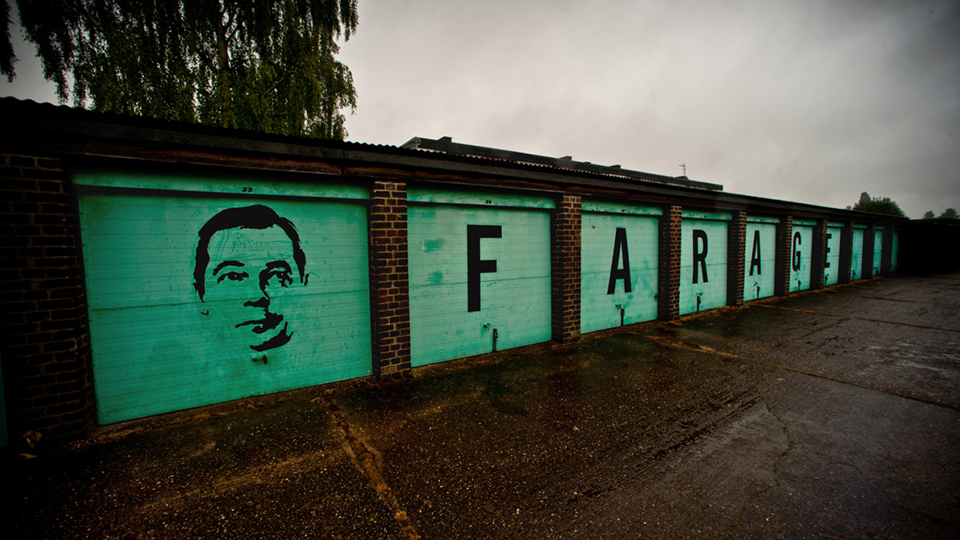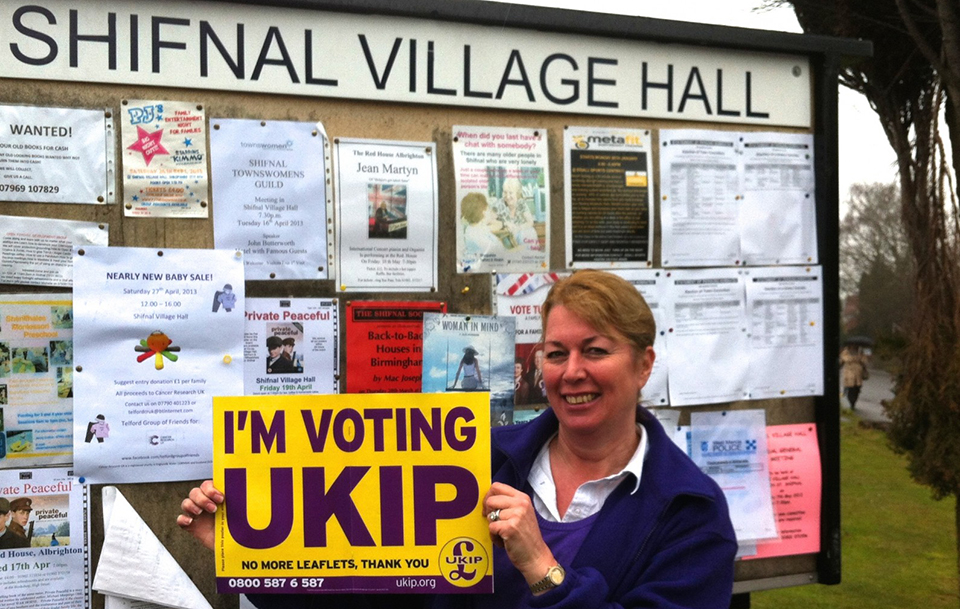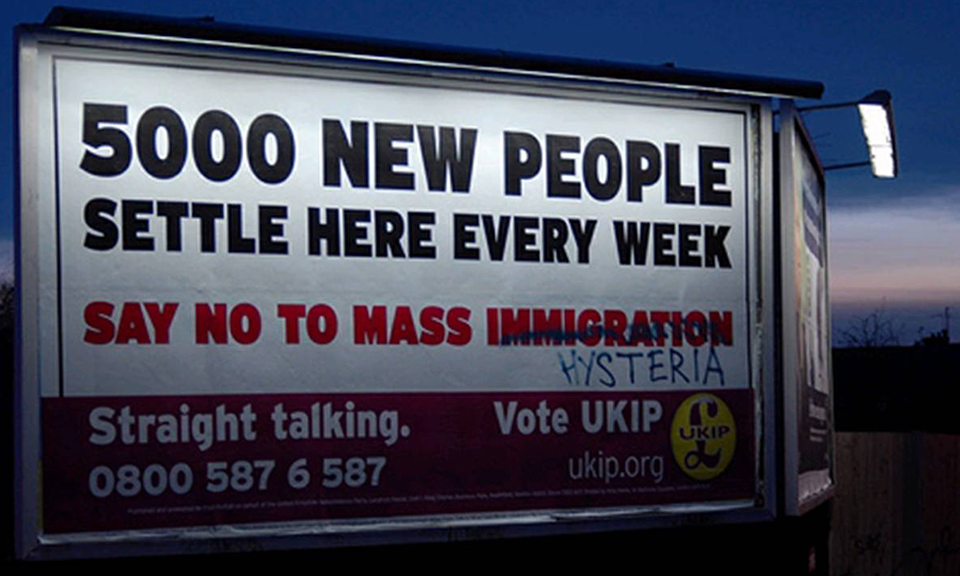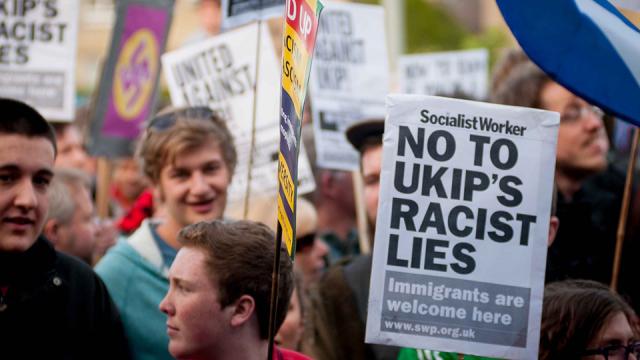
In late May, the anti-immigrant, eurosceptic U.K. Independence Party, or UKIP, became the first party in more than 100 years – apart from the Labour Party or the Conservative Party – to come in first in a U.K.-wide election, gaining 24 of a possible 73 seats in European Parliament while making significant gains in local council elections as well. The results aren't only an indicator of what may lie ahead in U.K. general elections next year, but a chance to measure up the populist and increasingly xenophobic sentiments boiling over in Britain.
UKIP was formed 21 years ago as a reaction to the drafting of the Maastricht Treaty, which introduced free movement within the European Union. The party states its central aim is to withdraw the U.K. from the E.U. while ensuring the country deals with its European neighbors solely in regards to trade.
As part of this new autonomy and freedom from the E.U., UKIP would also impose fresh immigration laws that freeze immigration for five years and put strict controls on immigration after that period – meaning that free education, benefits, social housing and non-emergency treatment within the National Health Service would be denied to immigrants for the first five years of their residence in Britain.
“People want a bold new politics,” says newly elected UKIP Member of the European Parliament, James Carver, who won a seat in Ledbury in Hertfordshire.
“The established political parties have staked their political reputations on Britain's membership of the European Union and it's quite clear from the five and a half million people who voted UKIP that a significant proportion of the British public disagrees with them. These voters see the advantages of trading globally without being tied into a political E.U. which is economically failing and democratically flawed.”
He insists that he doesn't “have a problem with immigration” but “every sovereign nation should have the right to decide the criteria which dictates who is allowed to come and live in their country.” Carver advocates “controlled” immigration, because he believes it is “not fair that a Jamaican, Indian or other non-European immigrant should have such a difficult time when a Polish immigrant can just enter the country unconditionally.”
How does he feel about UKIP's chances in the general elections next year? “I think we're going to make a breakthrough in the general elections. I've been in the party for a long time and I've noticed a completely different feeling on the doorstep recently. We're getting support from all sorts of people – from minority communities, young people, women. People the media would have you believe we could never count as supporters.”
The party has been widely criticized as a result of inflammatory comments made by its members. Just before the European elections, UKIP candidate Anna-Marie Crampton was stripped of her candidacy after she was caught on a conspiracy theory website suggesting that the Jews started the First World War and “sacrifice[d] their own in gas chambers” in order to “make the world feel so guilty and outraged by the Holocaust that a treaty would be signed to create the State of Israel as we know it today.”
Councillor Dave Small was dismissed from his role several weeks ago after he took to Twitter to complain that Muslims are "devil's kids" and homosexuality "an abomination before God."
Carver maintains that the party always deals with this kind of outburst in the appropriate fashion – and that other parties are just as prone to similar behavior:
“If any of our candidates come out with racist or otherwise offensive comments we take it very seriously and they are ejected from the party. Bear in mind there have been 16 Labour, Liberal Democrat or Conservative councillors criticized, disciplined or ejected from their seats for racist, sexist or homophobic remarks in the past few weeks. We don't have a monopoly on these idiots.”
He points out that the party's representatives include Amjad Bashir, the party's business spokesperson, who is of Pakistani descent, and newly-elected gay MEP David Coburn.
UKIP councillor Mike Baldock was elected in Swale West in Kent in October 2013.
“After the signing of the Treaty of Lisbon, as part of which we were yet again denied a referendum on E.U. membership, I left the Labour Party,” Baldock explains. “The Treaty of Lisbon effectively kills off democracy in this country. It doesn't matter whether you elect Labour or Tory governments – all they are doing is pottering round the edges while implementing E.U. legislation.
"After Lisbon, the most fundamental question in British politics became simply whether we wish to retain parliamentary sovereignty or whether we wish to cede our democracy to unelected commissioners in Brussels.”
Baldock was cautious about joining the party at first because he was “aware of its media representation.” “I met the local party,” he recalls “and found a group of honest people who cared only about their local area and getting democracy back, with none of the rancid extremism I had expected from their portrayal in the papers.” He then met UKIP leader Nigel Farage, an encounter which tipped him over the edge into joining.
How does he explain the stream of gaffes? Baldock chalks this down largely to inexperience. “Because UKIP is largely made up of activists who lack the polish and finesse of the trained politicians of other parties, things are easily said that could be twisted. It is very difficult for many people to sustain a defense of their position when arguing with people better able to misrepresent and challenge these positions with tangential and often irrelevant arguments.”
Baldock rules out a victory in the next general elections but believes the party will still do well. “I don't think we can win outright,” he says. But, “do I think we can win seats in Westminster? Yes, possibly 20 [to] 30. A year ago I would have laughed at the thought!”
So What do the Voters Think – and Why UKIP?
“Frustration and disillusionment with the mainstream parties, apropos the abject stupidity of their leaders,” answers UKIP supporter Olly. “'Racism' was an emotive word pounced on and cynically exploited [and] exaggerated by the other parties in their panic, the BBC in its servility to the politicians, the establishment in its (hitherto) complacency, and press 'barons' hoping for a gong and ermine for services rendered. The thing is, it worked like a charm.”
Olly goes on to attribute UKIP's lack of success in London to the fact that “UKIP appeals to an indigenous patriotic electorate, not recent arrivals.” South London resident Lucy Roberts also laments the absence of a breakthrough in the capital, complaining that “the melting pot I live in has gone too far – my local area feels like another country.”
Roberts's sister, Sarah, chimes in: “Nigel Farage is the only one who is actually listening to us. He's the only one who seems real. The others are just clones – they're just a bunch of beta males. I want something different.”
Meanwhile, many voters outside London found themselves landed with UKIP representatives that they really didn't want. “Slh Dave” is an anti-fascist activist living in Thurrock, Essex, an area on the outskirts of London. He is concerned that the apathy of local councillors from other parties may make UKIP “hard to shift.” Slh Dave explains: “While many are claiming this as a protest vote, we don't know how it will pan out once some of the UKIP councillors have got their feet under the table and got stuck into attending council meetings, sitting on committees and doing the case work for the constituents in their ward."
"Obviously, immigration was a factor in making some people decide to vote UKIP, particularly in Thurrock, but there was also an element of people concluding that the existing bunch of councillors simply weren't fit for purpose and that it was worth a punt on UKIP to see how they get on. This was particularly the case in Basildon [a nearby area to Thurrock which saw UKIP gain 12 of its 42 council seats] where there was widespread discontent with what was seen as an arrogant and out-of-touch Tory administration,” he said.
Nick Lowles is chief executive of the anti-fascist pressure group Hope Not Hate. He believes low turnouts were a huge factor in UKIP's success. “The local and European election results were deeply worrying for all anti-racists in the U.K. UKIP, a right wing party which pushes an anti-immigrant agenda, tapped in to the growing disconnect between ordinary people and the political class."
He adds, "With its simple solutions and anti-immigrant rhetoric, it galvanized those feeling ignored and forgotten by offering them an easy group to kick. However, the biggest winner of these elections was apathy. Only a third of people voted and in some of our poor communities turnout was just 20%.”
Lowles is concerned that other parties might try and tap into the anti-immigrant zeitgeist rather than finding other ways to win back voters. “There is a temptation for the mainstream parties to swing to the right in order to win back the UKIP voter. As anti-racists, we must oppose this without compromise," he says. "What is needed instead is an economic alternative that gives people hope for a better tomorrow. Until we can offer people that then UKIP will continue to grow and the majority of Britons will continue to think the political class do not speak for them and stay at home.”
Political analyst Lewis Baston is skeptical about just how much of a threat UKIP really poses, believing the local and Euro election results don't offer a realistic projection of the general elections to be held next year. “The election is still wide open in 2015,” he insists. “Although there are forces of populism at work here just as in other European countries – most notably France, where of course Front National won the most seats in the Euros.”
Baston believes the party's lack of popularity in London might just swing the general election vote. “The local and European election results clearly show that London, with its multiculturalism, diversity and openness to the rest of the world, is very different to the rest of England where UKIP did so well. Despite the number of seats UKIP gained in the Euros, the results still suggest it will be a contest between Labour and Conservatives in the general elections in 2015, with the Liberal Democrats lagging behind.”
At the time of writing, leading British bookmakers Ladbrookes offered the following odds on the 2015 general election result: 7/4 for a Labour majority, 11/4 for a Conservative majority – and 66/1 for a UKIP majority.
3 WAYS TO SHOW YOUR SUPPORT
- Log in to post comments

